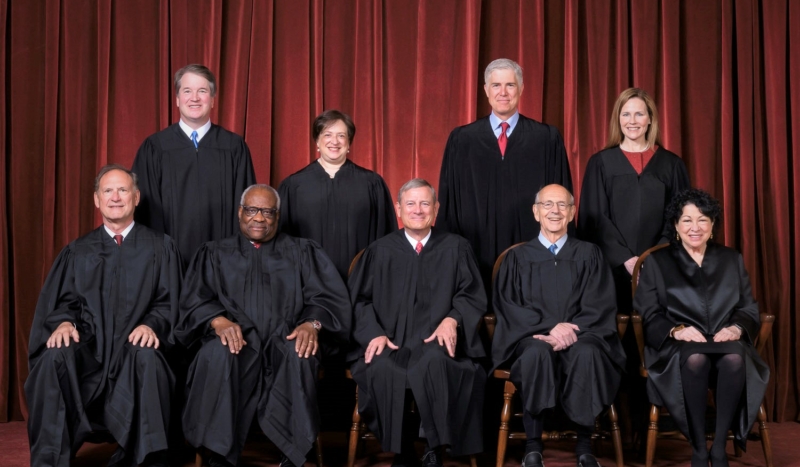
The Roberts Court, April 23, 2021 Seated from left to right: Justices Samuel A. Alito, Jr. and Clarence Thomas, Chief Justice John G. Roberts, Jr., and Justices Stephen G. Breyer and Sonia Sotomayor Standing from left to right: Justices Brett M. Kavanaugh, Elena Kagan, Neil M. Gorsuch, and Amy Coney Barrett. Photograph by Fred Schilling, Collection of the Supreme Court of the United States
CV NEWS FEED // Mississippi Attorney General Lynn Fitch called on the Supreme Court to overturn Roe v. Wade, calling the ruling “egregiously wrong.”
Fitch made the argument Thursday in the initial legal brief for a Mississippi case which the Supreme Court accepted in May.
The case initially raised the question of whether Mississippi could enact a ban on abortions after 15 weeks of gestation. The wider implications of that question, however, quickly led commentators on both sides of the abortion battle to speculate about a possible showdown over Supreme Court precedents affirming the legality of abortion.
With the publication of the Mississippi legal brief this week it became clear that the case directly implicates Roe v. Wade — the landmark 1973 Supreme Court ruling that legalized abortion in all 50 states, and Planned Parenthood vs. Casey, a 1992 ruling that added more legal heft to the so-called constitutional “right” to abortion.
“Roe and Casey are unprincipled decisions that have damaged the democratic process, poisoned our national discourse, plagued the law — and, in doing so, harmed this Court,” according to the brief.
“Roe and Casey are … at odds with the straight-forward, constitutionally grounded answer to the question presented. So the question becomes whether this Court should overrule those decisions,” the brief states. “It should. The stare decisis case for overruling Roe and Casey is overwhelming.”
“The conclusion that abortion is a constitutional right has no basis in text, structure, history, or tradition,” the document states elsewhere:
…Nor can a right to abortion be justified under Obergefell v. Hodges, which recognized a fundamental right to marry. Obergefell applied the understanding that when a right “is fundamental as a matter of history and tradition”—like marriage—then a State must have “a sufficient justification for excluding the relevant class” from exercising it. That understanding has no relevance here, where the question is not “who [may] exercise[ ]” a fundamental right to abortion but whether the Constitution protects such a right at all.”
The Supreme Court is slated to begin examining the case in the fall of 2021, with a final ruling likely to come in the summer of 2022.
“This is a moment that the pro-life movement has worked toward for nearly 50 years,” said CatholicVote Political Director Joshua Mercer Thursday.
“For Catholics, it is both an answer to prayers and an urgent call to pray like never before,” Mercer added:
There is no overstating the importance of this case. If our justices take the central issue of the case head-on and rule justly, it could mean the salvation of countless millions of lives.

